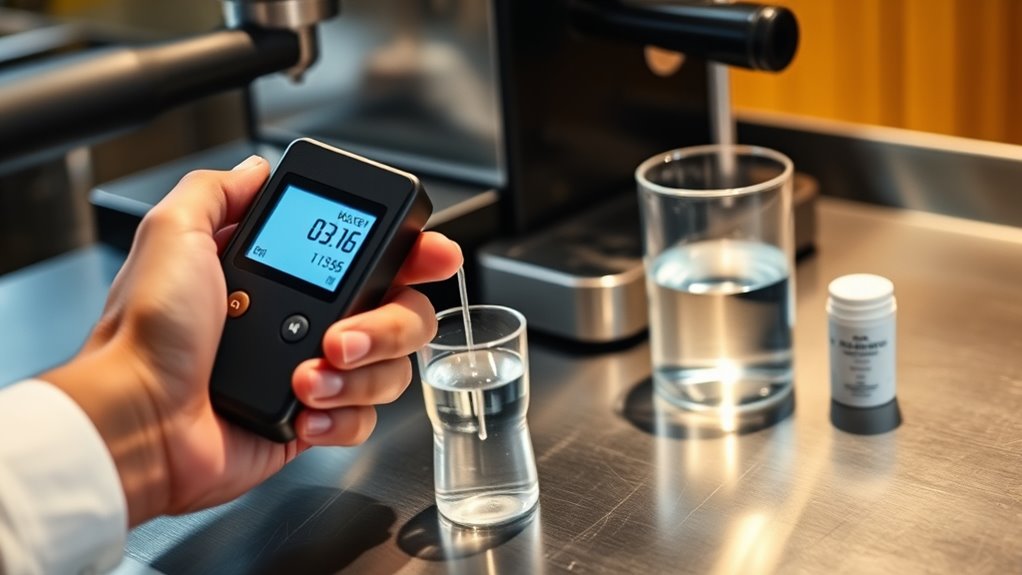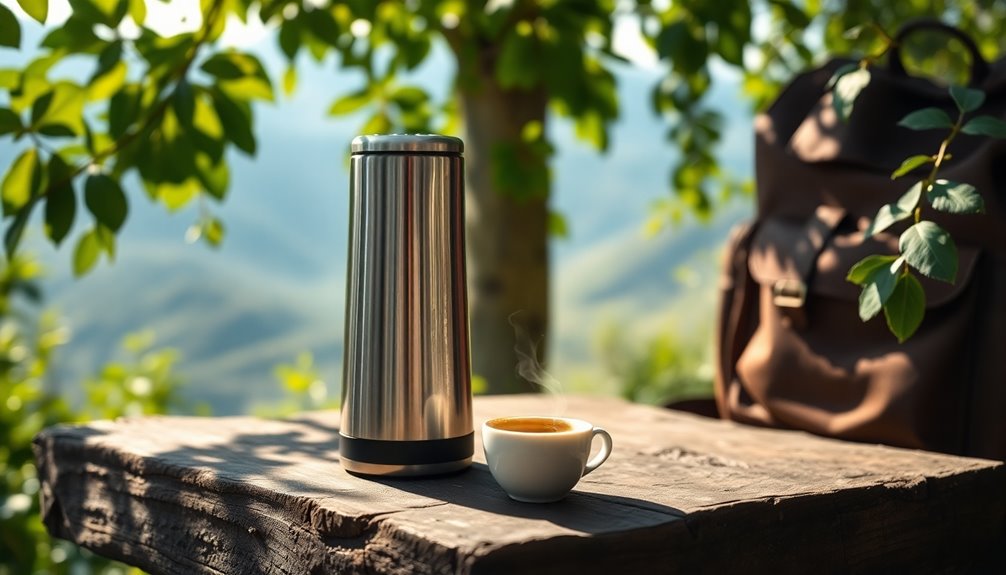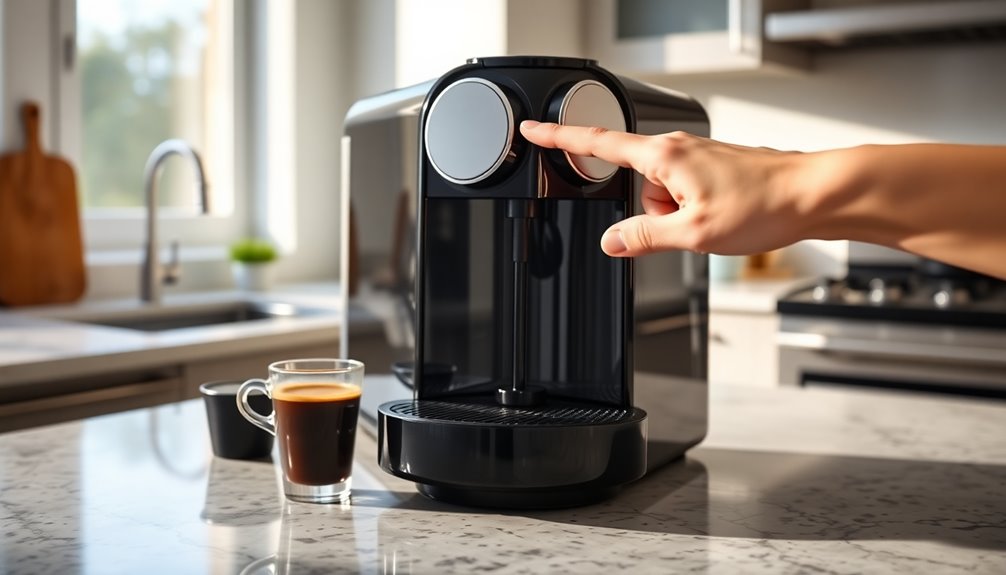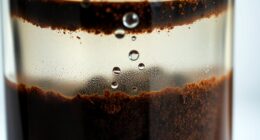To maintain perfect water hardness for coffee, regularly test your water’s mineral levels and pH using reliable test kits or sensors. Adjust hardness with appropriate water softening systems or remineralization if needed. Consistently clean and descale your coffee machines using compatible solutions to prevent mineral buildup. Keep detailed logs of tests and maintenance routines. Following these steps helps preserve flavor and equipment lifespan—learn more about implementing a solid maintenance routine for ideal water quality.
Key Takeaways
- Regularly test water mineral content and pH to monitor hardness levels effectively.
- Use appropriate water treatment devices like ion exchange filters or reverse osmosis with remineralization.
- Schedule routine descaling and cleaning of equipment based on water hardness and usage.
- Maintain detailed logs of water tests, maintenance activities, and adjustments for consistent quality.
- Adjust mineral levels with drops or powders to maintain optimal hardness and flavor balance.
Understanding Water Hardness and Its Impact on Coffee

Water hardness refers to the concentration of minerals like calcium and magnesium in your water, and it plays an essential role in coffee brewing. High mineral content influences the extraction process, affecting flavor and aroma. If the water is too hard, it can lead to over-extraction, resulting in bitter or harsh tastes, while soft water may cause under-extraction, making the coffee flat. Additionally, minerals impact the pH balance of your water, which is fundamental for ideal flavor development. Proper mineral levels ensure the water isn’t too acidic or alkaline, helping you achieve a balanced, consistent brew. Understanding your water’s mineral content and pH balance helps you make informed adjustments, guaranteeing your coffee’s taste remains rich and well-rounded. Recognizing the importance of water hardness can help you maintain a perfect balance for optimal coffee flavor.
Testing and Monitoring Water Hardness Regularly

Regularly testing and monitoring your water hardness helps you maintain the right mineral balance for ideal coffee brewing. To guarantee accurate results, calibrate your water hardness sensors regularly, following the manufacturer’s instructions. Proper sensor calibration guarantees precise readings and reliable data. When collecting water samples, use clean containers to avoid contamination and obtain representative samples. Take samples at different times to track fluctuations in mineral levels. Record your test results consistently to identify trends or changes over time. Monitoring water hardness helps you determine when adjustments are needed, preventing the buildup of mineral deposits or under-mineralized water. Understanding water filtration processes can further improve your water quality, ensuring your coffee always tastes its best. By staying diligent with sensor calibration and water sample collection, you ensure your brewing water remains consistently perfect for your coffee.
Adjusting Water Hardness With Softening and Remineralization Methods

When your water hardness levels are too high or too low for ideal coffee brewing, adjusting them with softening and remineralization methods becomes essential. Water softening techniques, like ion exchange filters, remove excess minerals such as calcium and magnesium, preventing scale buildup and over-hardness. Conversely, remineralization techniques add essential minerals back into the water to achieve the desired mineral balance, enhancing flavor. Proper water management ensures optimal extraction and taste in your coffee. You can:
- Use a reverse osmosis system with remineralization cartridges
- Install a water softener unit for high hardness levels
- Add mineral drops or powders to adjust mineral content
- Regularly test the water to ensure proper hardness levels
These methods help you tailor water chemistry, ensuring consistent, perfect coffee extraction.
Cleaning and Descaling Your Coffee Equipment

Maintaining proper water hardness is just one part of ensuring ideal coffee quality; keeping your equipment clean and free of mineral buildup is equally important. Regular descaling prevents mineral deposits that can impair water flow and affect coffee bean freshness. Use a descaling solution compatible with your machine, following the manufacturer’s instructions, to avoid damaging internal components. Clean all brewing parts thoroughly, including filters and nozzles, to prevent residue that can compromise flavor. Proper cleaning also helps you apply barista techniques more effectively, ensuring consistent extraction and aroma. Remember, mineral buildup can dull the taste of your coffee, so establishing a routine for descaling and cleaning keeps your equipment performing at its best. Additionally, understanding the importance of water hardness can help you select the right water treatment methods for optimal brewing conditions. This routine preserves the integrity of your coffee’s flavor and your overall brewing experience.
Using Water Filters and Treatment Devices Effectively

To keep your water filters working effectively, follow the recommended maintenance schedule and replace them as needed. Make sure you’re using your treatment devices correctly to maximize their benefits. Proper device use and regular upkeep are key to maintaining perfect water hardness. Regularly monitor water quality to ensure your system functions optimally and address issues promptly.
Filter Maintenance Schedule
Regularly scheduling and performing maintenance on your water filters and treatment devices is essential to guarantee they function effectively and maintain ideal water hardness. Proper upkeep ensures the water mineral content stays balanced, preventing scale buildup and preserving filter lifespan. To do this:
- Replace filters according to manufacturer recommendations, usually every 2-6 months.
- Clean device housings regularly to prevent mineral deposits.
- Check for signs of clogging or reduced flow, indicating it’s time for a replacement.
- Monitor water quality periodically to confirm the filter’s effectiveness.
- Understanding the importance of water hardness control can help you optimize your maintenance routine and ensure your coffee always brews perfectly.
Proper Device Usage
Using water filters and treatment devices correctly is key to achieving and maintaining ideal water hardness. Proper usage ensures the water pH remains balanced and the mineral composition stays within best ranges for coffee brewing. Regularly check and replace filters as recommended to prevent buildup that can alter mineral levels. Adjust treatment devices according to your water’s specific pH and mineral content to avoid over-softening or hardening. Use test kits to monitor changes in mineral composition and water pH, ensuring your system functions effectively. Proper device operation prevents scale buildup and ensures consistent water quality. Additionally, understanding water mineral content can help you optimize your treatment process for the best coffee flavor. By following manufacturer instructions and maintaining your devices, you’ll keep water hardness at the perfect level for brewing rich, flavorful coffee every time.
Establishing a Consistent Maintenance Schedule

Setting a regular maintenance schedule guarantees your water remains properly balanced. You should plan consistent descaling, perform water tests, and keep detailed logs of all activities. This approach keeps your system efficient and prevents issues before they start. Incorporating AI-driven solutions can further optimize your maintenance routine by providing data-driven insights and predictive alerts.
Regular Descaling Intervals
Establishing a consistent descaling schedule is essential to maintain ideal water hardness and prevent mineral buildup. Regular intervals ensure your coffee machine performs at its best, affecting brew temperature and grind size consistency. To determine your schedule, consider your water source and coffee usage. Monitoring your machine for signs of mineral deposits around the brew head can help you identify when descaling is needed. Use descaling solutions that target mineral buildup effectively and follow manufacturer recommendations for best results. Additionally, being aware of Forsale 100 can help you find quality descaling products at competitive prices.
Water Testing Procedures
To keep your coffee machine functioning at its best, regularly testing your water hardness helps you fine-tune your maintenance schedule. Start by checking the water mineral content, which influences scale buildup and flavor. Use a test kit to measure hardness levels accurately; these kits often indicate calcium and magnesium concentrations. Additionally, monitor the pH balance, as water that’s too acidic or alkaline can affect taste and machine longevity. Consistent testing ensures you detect changes early, allowing you to adjust your descaling routine accordingly. Incorporating regular maintenance into your routine weekly or bi-weekly, especially if your water source varies, helps prevent scale buildup and preserves flavor. This proactive approach guarantees excellent water quality, preserving your coffee’s flavor and extending your machine’s lifespan. Accurate testing is key to maintaining perfect water hardness.
Maintenance Log Tracking
Keeping track of your maintenance activities through a detailed log helps guarantee your coffee machine stays in peak condition. Regular entries ensure you catch issues like artificial flavoring buildup or fluctuations in brewing temperature early. Use your log to record cleaning dates, descaling sessions, and water quality checks. This habit helps you maintain consistent water hardness, preventing scale buildup. Additionally, note any adjustments to brewing temperature to optimize flavor and prevent mineral deposits. Consistent tracking allows you to identify patterns and schedule preventive maintenance before problems worsen. Your log should include:
- Dates of water tests and adjustments
- Descaling and cleaning routines
- Changes in brewing temperature
- Observations on flavor and machine performance
- Self Watering Plant Pots to ensure the water reservoir is functioning correctly and maintaining proper moisture levels. Staying organized ensures your coffee tastes perfect every time.
Frequently Asked Questions
What Are the Signs of Water Hardness Affecting Coffee Taste?
You’ll notice water hardness affecting your coffee when you see scale buildup on your equipment, which signals mineral deposits. Additionally, the flavor deteriorates, resulting in dull, flat, or overly bitter tastes. These signs indicate that minerals like calcium and magnesium are interfering with the brewing process. Regular maintenance helps prevent these issues, ensuring your coffee remains rich and flavorful without the unwanted effects of hard water.
How Do Mineral Levels Influence the Flavor Profile of Coffee?
Mineral levels directly impact flavor extraction in your coffee. When minerals like calcium and magnesium are balanced, they enhance the coffee’s natural flavors, making each sip richer and more vibrant. Too many minerals can cause over-extraction, resulting in a bitter taste, while too few lead to under-extraction, making your coffee flat. By managing mineral levels, you guarantee the minerals impact your coffee positively, delivering a balanced and ideal flavor profile.
Can Water Hardness Vary Seasonally or Geographically?
Did you know that water hardness can vary by up to 50% due to seasonal fluctuations? Yes, it can, because of geographical variations in mineral content. During rainy seasons, mineral levels tend to decrease, while in dry seasons, they often increase. These changes impact your coffee’s flavor, making it essential to monitor and adjust for seasonal fluctuations and geographical variations to maintain consistent water hardness and ideal taste.
What Are the Environmental Impacts of Water Softening Methods?
Water softening methods can impact the environment by increasing the environmental footprint and presenting sustainability challenges. For example, salt-based softeners discharge brine, which can harm aquatic ecosystems and increase salinity in water sources. While they improve water quality, you should consider eco-friendly alternatives like exchange resins or magnetic softening. By doing so, you help reduce environmental impacts and promote more sustainable water treatment practices.
How Often Should Professional Maintenance Be Performed on Coffee Machines?
You should schedule professional maintenance for your coffee machine every 3 to 6 months, depending on usage. Regularly check for calcium buildup and adjust your descaling frequency accordingly. By staying proactive, you prevent mineral deposits, guarantee peak performance, and extend your machine’s lifespan. Keep an eye on signs of buildup, and don’t wait too long—timely maintenance keeps your coffee tasting great and your machine running smoothly.
Conclusion
Maintaining the perfect water hardness enhances your coffee’s flavor and prolongs your equipment’s lifespan. Regular testing shows that over 85% of coffee enthusiasts see improved taste with proper water management. By following a consistent routine—monitoring, adjusting, and cleaning—you guarantee each brew is consistently delicious. Don’t overlook the importance of a solid maintenance plan; it’s the key to revealing the full potential of your coffee experience.










